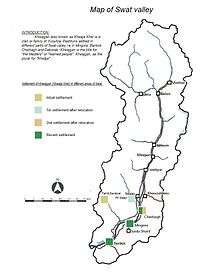Khwajgan (Khwaja Khel)
| Khwajgan خواجګان | |
|---|---|
_of_Swat_page-1_%26_2.jpg) | |
|
(Khwaja Khel) Khwaja Khel (including those of ancestral descent) | |
| Regions with significant populations | |
| Primarily Afghanistan, Swat State and recently Swat District | |
| Languages | |
| The Yusufzai dialect of Pashto (Pakhto پښتو) (Native) | |
| Religion | |
| Islam (Sunni) |
Khwajgan,(Pashto: خواجګان) also known as Khwaja Khel,(خواجه خېل) is a clan or family of Yusufzai[1] Pashtuns settled in different parts of Swat valley Pakistan i-e in Mingora, Barikot,[2] Charbagh and Dakorak. Khwajgan is the title for "the Masters" or "learned people".[3][4][5] Khwajgan, as the plural for "Khwāja", is often used to refer to a network of Sufis in Central Asia from the 10th to the 16th century who are often incorporated into later Naqshbandi hierarchies,[6] as well as other Sufi groups, such as the Yasaviyya. In Firdowsi's Shahnama the word is used many times for some rulers and heroes of ancient Iran as well. Khwajgan or Khwaja Khel of Swat valley are those who follow Pashtunwali,[7] a non-written ethical code.
Settlements

In 16th century after the migration from Kabul and the conquest of Swat by Yusufzai's under the leadership of Ahmad Shah Yusufzai, Khwajgan were settled in a village of Kabal Tehsil named Tall Dardiyal and took the profession of business in their hands. With the passage of time Khwajgan were relocated to Matta in relocation system of Swat State. After some years they were again relocated to Dakorak, Charbagh with the same system and land were allotted to the family in the village of Dakorak.
.jpg)
Recent settlement
The first known persons of Khwajgan family at Swat was Fazal Ahmad and Habib Baba. Fazal Ahmad had three sons Sayyaden Shah, Nawab Shah and Muhammad which is now descended to almost eight generations. In the 20th century, after the urbanization of The Yusafzai State of Swat due to their business needs Khwajgan were settled in different towns and cities of Swat. Mostly in Mingora, Charbagh ,Bandai,swat and Barikot.
See also
Bibliography
- Masters Of Wisdom: An Esoteric History of the Spiritual Unfolding of Life on This Planet by J.G. Bennett, ISBN 0-87728-466-0
- Masters Of Wisdom of Central Asia by Hasan Shusud, ISBN 0-900306-93-9
- The Teachers of Gurdjieff by Rafael Lefort, ISBN 0-87728-213-7
- The Naqshbandi Sufi Way, History and Guidebook of the Saints of the Golden Chain by Shaykh Muhammad Hisham Kabbani, Kazi Publications, USA (1995), ISBN 0-934905-34-7
References
- ↑ Khan, Roshan (1986). Yūsufzaʼī qaum kī sarguzasht. Karachi: Roshan Khan and Company.
- ↑ Wardak, A. (2003) "Jirga – A Traditional Mechanism of Conflict Resolution in Afghanistan" p. 7, online at UNPAN (the United Nations Online Network in Public Administration and Finance), accessed 10 January 2009
- ↑ Masters Of Wisdom of Central Asia by Hasan Shusud, ISBN 0-900306-93-9
- ↑ Masters Of Wisdom: An Esoteric History of the Spiritual Unfolding of Life on This Planet by J.G. Bennett, ISBN 0-87728-466-0
- ↑ The Teachers of Gurdjieff by Rafael Lefort, ISBN 0-87728-213-7
- ↑ The Naqshbandi Sufi Way, History and Guidebook of the Saints of the Golden Chain by Shaykh Muhammad Hisham Kabbani, Kazi Publications, USA (1995), ISBN 0-934905-34-7
- ↑ "Understanding Pashto". University of Pennsylvania. 2006. Retrieved 18 January 2007.
External links
- Online Copy of a short version of Shushud's Masters of Wisdom, translated by J. G. Bennett and published in Systematics
- The Riddle of Balkh, the Elevated Candle
- Gurdjieff and Sufism